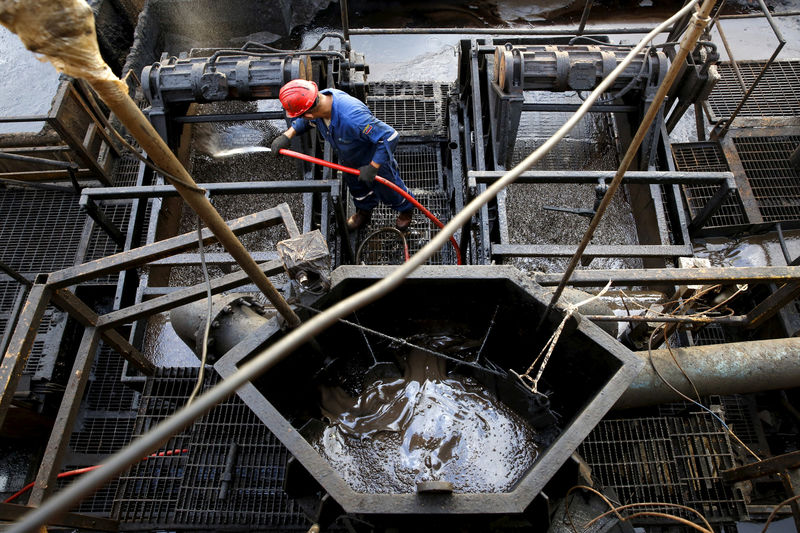By Reem Shamseddine, Rania El Gamal and Alex Lawler
VIENNA (Reuters) - Saudi Arabia promised on Thursday not to flood the oil market with extra barrels even as OPEC failed to agree on output policy, with Iran insisting on the right to raise production steeply.
Tensions between the Sunni-led kingdom and the Shi'ite Islamic Republic have been the highlights of several previous OPEC meetings, including in December 2015 when the group failed to agree on a formal output target for the first time in years.
Tensions, however, were less acute on Thursday as Saudi Arabia's new energy minister, Khalid al-Falih, showed Riyadh wanted to be more conciliatory and his Iranian peer Bijan Zanganeh kept his criticism of Riyadh to an unusual minimum.
In a rare compromise, OPEC also decided unanimously to appoint Nigeria's Mohammed Barkindo as its new secretary-general after years of friction over the issue.
Saudi Arabia and its Gulf allies had tried to propose OPEC set a new collective ceiling in an attempt to repair the group's waning importance. But Thursday's meeting ended with no new policy or ceiling amid resistance from Iran.
Despite the setback, Saudi Arabia moved to soothe market fears that failure to reach any deal would prompt OPEC's largest producer, already pumping near record highs, to raise production further to punish rivals and gain additional market share.
"We will be very gentle in our approach and make sure we don't shock the market in any way," Falih told reporters.
"There is no reason to expect that Saudi Arabia is going to go on a flooding campaign," Falih said when asked whether Saudi Arabia could accelerate production.
The market has grown increasingly used to OPEC clashes over the past two years as political foes Riyadh and Tehran fight proxy wars in Syria and Yemen.
Saudi Arabia effectively scuppered plans for a global production freeze - aimed at stabilizing oil markets - in April in the Qatari capital of Doha. It said then that it would join the deal, which would also have involved non-OPEC Russia, only if Iran agreed to freeze output.
Tehran argues it should be allowed to raise production to levels seen before the imposition of now-ended Western sanctions over Iran's nuclear program.
Zanganeh said Tehran would not support any new collective output ceiling and wanted the debate to focus on individual-country production quotas, effectively abandoned by OPEC years ago.
"Without country quotas, OPEC cannot control anything," Zanganeh told reporters. He insisted Tehran deserved a quota - based on historic output levels - of 14.5 percent of OPEC's overall production.
OPEC is pumping 32.5 million barrels per day (bpd), which would give Iran a quota of 4.7 million bpd - well above its current output of 3.8 million, according to Tehran's estimates, and 3.5 million, based on market estimates.
"BENIGN DEAL"
At its previous meeting in December 2015, OPEC effectively allowed its 13 members to pump at will.
As a result, prices crashed to $27 per barrel in January, their lowest in over a decade, but have since recovered to around $50 due to global supply outages. On Thursday, Brent prices eased 1.5 percent to $49 per barrel. [O/R]
That OPEC could not agree on a benign deal is a sign that political differences are undermining the organization, said Gary Ross, founder of U.S.-based PIRA consultancy.
"It is bearish short-term for oil prices. But what is also important is that Saudis are not planning to flood the market," Ross added.
Zanganeh made a few conciliatory remarks, saying he was happy with the meeting and received no signals from other producers that they planned to increase output.
For Amrita Sen of Energy Aspects, who like Ross traveled to Vienna to meet OPEC officials, the meeting sent an encouraging signal about the state of the organization.
"After the Doha debacle, it actually restores market confidence that Saudi Arabia is committed to OPEC. This is a success compared to three days ago when people had been expecting Falih to walk out of the OPEC room," said Sen.
Falih was the first OPEC minister to arrive in Vienna this week, signaling he takes the organization seriously despite fears among fellow members that Riyadh is no longer keen to have OPEC set output.
"There could be shorter-term situations in which, in our view, OPEC might intervene and yet other situations — such as long-term growth of marginal barrels — in which case it should not," Falih told Argus Media ahead of the meeting.
For a Take-a-Look on Reuters stories on OPEC, click on
